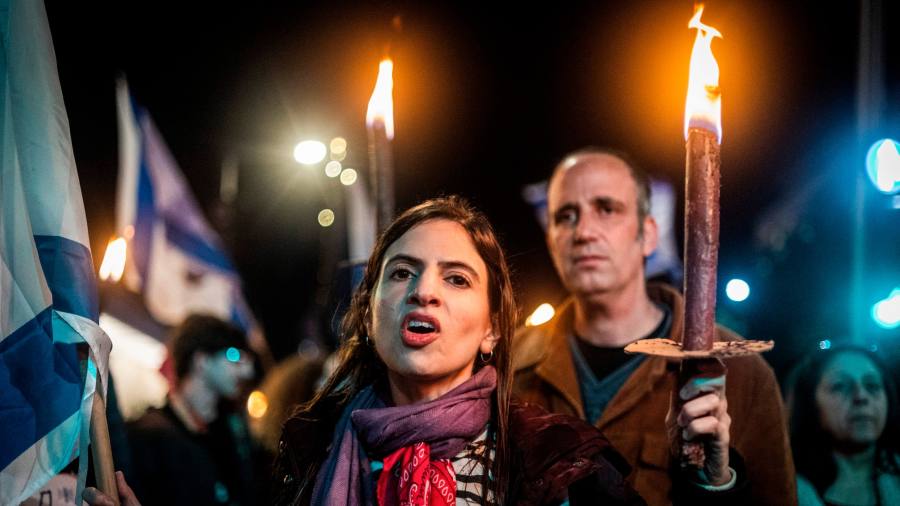[ad_1]
Tens of thousands of Israelis took to the streets on Saturday night to protest against the country’s hardline new government and its plans to impose sweeping curbs on the power of the judiciary.
Police estimated that around 80,000 people attended the biggest demonstration in the liberal bastion of Tel Aviv, where protesters chanted “no democracy without the High Court” and waved placards with slogans such as “Save Israel”.
Smaller protests also took place outside the presidential palace in Jerusalem, and in the northern city of Haifa.
The demonstrations are the biggest show of public defiance since Benjamin Netanyahu returned to power last month at the head of a coalition widely regarded as the most rightwing in Israeli history.
The new government, which combines Netanyahu’s Likud with two ultraorthodox groups and three extreme right parties, has made overhauling the country’s judiciary one of its key objectives.
Earlier this month, the justice minister, Yariv Levin, proposed changes that would give the government and its allies control over the appointment of judges, and allow a simple majority in parliament to override High Court decisions to strike down laws.
Israel’s rightwing parties have long demanded an overhaul of the judiciary, arguing that the top court has become increasingly activist over the past three decades, and used powers it was never formally granted to push a broadly leftwing agenda.
However, the government’s proposals have sparked alarm among liberal and centrist Israelis, who see them as a politically motivated assault on Israel’s checks and balances that would undermine minority protections and fuel corruption.
Esther Hayut, the president of Israel’s top court, said on Thursday that the changes would destroy judicial independence, and give parliament a “blank cheque” to pass any laws it wanted, even if they violated basic civil rights.
“[If the changes are implemented] the 75th anniversary of Israel’s independence will be remembered as the year in which the country’s democratic identity was dealt a fatal blow,” she said.
Protesters who flocked to Habima Square in downtown Tel Aviv on Saturday night, despite bursts of heavy rain, expressed similar concerns. “If there are no [checks and balances], we can even end up like Hungary or other places where democracy died. So we have to stop it now, before it is too late,” said Eran, a middle-aged Tel Avivan who joined the protest with his wife Ilana.
“We need to keep Israel as a normal state so that the rest of the world will still talk to us. [If these judicial reforms are passed] the world will look at us like a crazy state . . . We want to be a free country where you can dress as you like and say what you want.”
Omer, who joined the protest with his partner and three-month old son, said that he had decided to attend because he was worried that the government’s plans would undermine democracy.
“If these laws are passed, the government will basically have the ability to destroy and delete the part [of the political spectrum] that isn’t in the coalition,” he said. “They are meant to be working for the whole country, not only for themselves.”
Government officials sought to play down the significance of the protests, and insisted that they would not be deterred from carrying out their program.
“Tens of thousands of people were at the demonstrations tonight. In the election held here two and a half months ago, millions turned out,” the culture and sport minister, Miki Zohar, wrote on Twitter.
“We promised the people change, we promised governance, we promised reforms — and we will make good on that.”
[ad_2]
Image and article originally from www.ft.com. Read the original article here.

